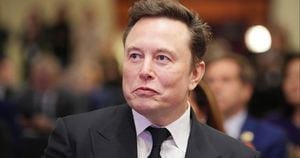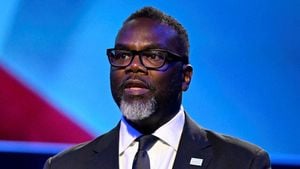Leaders of the G7 alliance have reaffirmed their unwavering support for Ukraine, as President Volodymyr Zelenskyy articulates his aspirations to bring the protracted conflict with Russia to a resolution through diplomatic negotiations by 2025. The backdrop of this renewed commitment to peace came as Zelenskyy voiced his intention to maximize efforts to end the war with Russia’s invading forces via negotiations next year.
On the airwaves, Zelenskyy expressed optimism during a radio interview, stating, "We must do everything so this war ends next year through diplomatic means." This call for peace resonates amid geopolitical shifts, particularly with the impending re-election of Donald Trump as President of the United States, which Zelenskyy suggested could lead to the conflict's cessation sooner than anticipated.
Trump’s recent comments about ending the war immediately and the suggestions of his Vice President-elect, JD Vance, have stirred concerns among украинians. The pair's rhetoric hinted at potential repercussions for Ukraine, with Vance hinting at the possibility of Moscow maintaining control over disputed territories. Despite this apprehension, Zelenskyy noted during his earlier discussions with Trump, he did not gather any sentiments opposing Ukraine's position.
Meanwhile, on the diplomatic front, Russian President Vladimir Putin remains steadfast, insisting any agreement must incorporate Ukrainian recognition of Russian control over territories seized during the conflict—a stark reminder of the deep divisions still separating the nations. Notably, during recent conversations with German Chancellor Olaf Scholz, Putin emphasized the necessity of addressing the “root causes” of the conflict, including NATO expansion.
G7 leaders, representing Canada, France, Germany, Italy, Japan, the United Kingdom, and the U.S., convened to reaffirm their support for Ukraine as they approach the grim milestone of nearly 1,000 days of Russia's military aggression. They reiterated their determination to impose severe penalties against Russia, declaring it the sole impediment to achieving lasting peace. The G7 pledged to maintain sanctions, export controls, and other measures aimed at imposing consequences on Russia.
Ukraine finds itself at a precarious crossroads as it prepares for the potential shifts with the upcoming Trump presidency. With many Western countries echoing their support for Kyiv, Zelenskyy stressed the urgent need for additional military aid and funding before Trump takes office, as ambiguities surrounding U.S. financial assistance hang over the horizon.
This uncertainty looms larger as Russian forces continue pushing forward with renewed vigor, particularly evident near eastern Ukraine. Local reports indicate Russian troops are intensifying their operations around Kurakhove, where strategic infrastructures like thermal power plants are under threat. Experts observe this is the most rapid progression made by Russian forces since the early days of the war, underscoring the dire situation on the ground.
Meanwhile, as Ukrainian forces face mounting pressure, the terrain of discussions is shifting, signaling readiness for negotiations—something British Representatives are actively emphasizing. With Donald Trump's administration poised to advocate some form of peace talks, British Members of Parliament are urging their government to support Ukraine’s quest for fair terms from its adversary during any potential negotiations.
British lawmakers have rallied to call for military aid and diplomatic engagement to fortify Ukraine's position as it seeks to end the war. They are adamant about backing Ukraine’s calls for a “just peace” as Zelenskyy accelerates his diplomatic outreach efforts, aligning with the sentiment of key international players.
Zelenskyy has demonstrated his willingness to engage with Trump, viewing his election as both encouraging and brimming with potential for accelerating talks. By positioning the Trump administration's negotiation abilities as beneficial, Zelenskyy has made it clear he seeks to leverage the new political environment to Ukraine's advantage.
The backdrop to this political maneuvering includes concerns about Ukraine's sovereignty and territorial integrity, which are central to any negotiations. Trump’s campaign has hinted at proposals for potentially freezing the frontlines, creating demilitarized zones along contested borders, and temporarily sidelining Ukraine's aspirations to join NATO for the foreseeable future.
While discussions remain tentative, the consensus among analysts is clear: any arrangement discussed must assure security for Ukraine, as skepticism about Russian intentions persists. The shadow of past agreements, such as the Minsk Accords, haunts current deliberations, where promises made were swiftly broken when Russia reneged on its commitments post-Crimea.
Despite the clouds of war hanging heavily, British officials continue to declare their commitment to supporting Ukraine through this transition. Statements from the parliamentary group assert the importance of ensuring no pressure is placed upon Ukraine to concede territory or sovereignty during any diplomatic negotiations. This reflects the broader sentiment among allies who recognize the necessity of Ukraine maintaining its territorial integrity.
With conflicts persisting on the battlefield and political tensions running high, the hope for negotiations looms large. Both Ukraine and its allies are bracing for what could be pivotal months leading up to and following the inauguration of Trump. Ukraine strives for international backing and firm resolve from its supporters as it navigates complex waters.
To many observers, the outcome of these negotiations holds the potential to reshape the regional and global geopolitical landscapes. The diligent push from Zelenskyy and the support from allies resonates as they seek to thwart Russian advances, reaffirm national sovereignty, and pursue peace through dialogue—while the drums of war continue to echo across the region.



